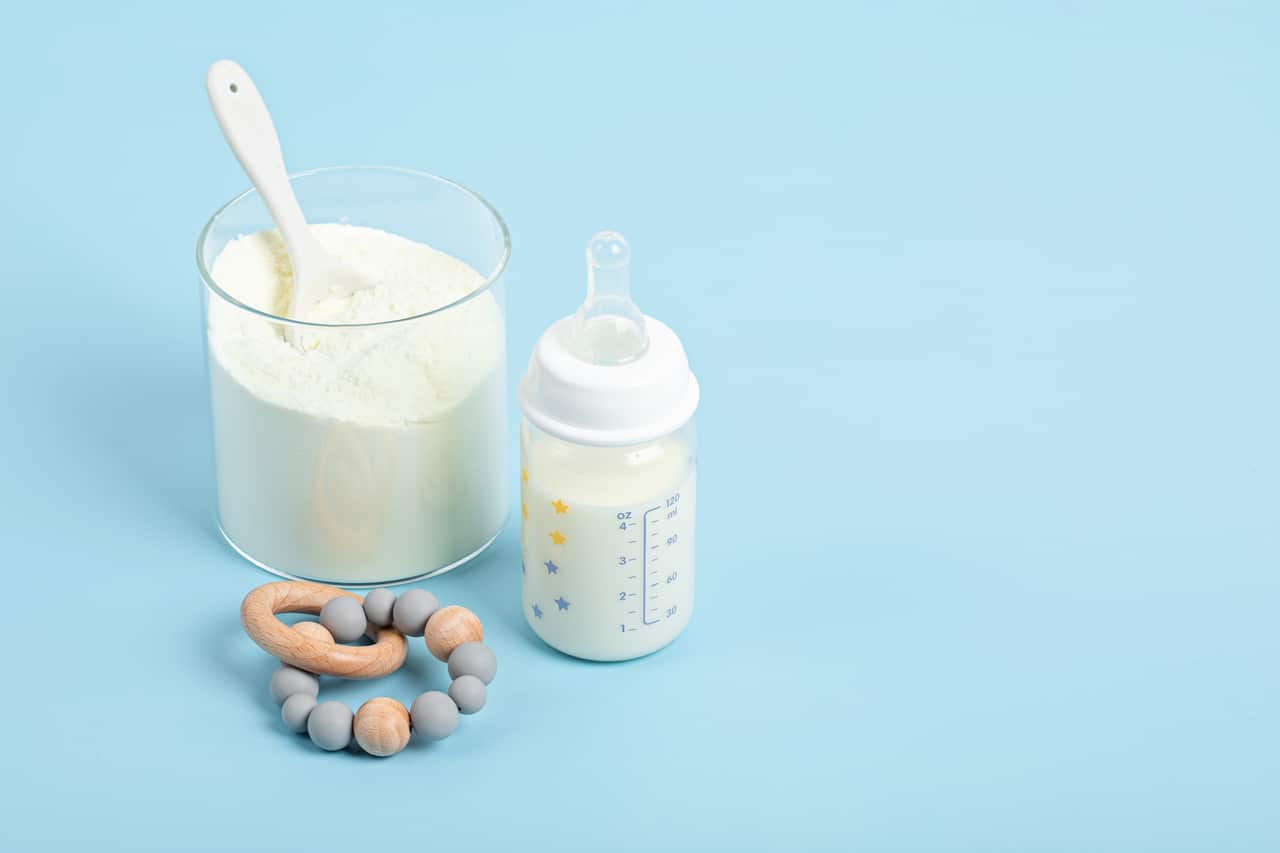Choosing the best possible baby formula for your child can be quite challenging nowadays. There are seemingly endless products being marketed as “the best” and brands vying for your attention.
The baby food aisles in supermarkets are packed with a plethora of baby formulas, and one of the most popular options is Enfamil. This well-known baby food brand offers many product variations, two of which include Enfamil Newborn Formula and Enfamil Infant Formula.
If you have chosen Enfamil as your preferred brand but are confused between these two popular formulas, we’re here to help you out. In this article, we delve into what each of their products really are, their pros and cons, and the difference between Enfamil Newborn and Infant formulas.
We hope this will help you choose a baby formula that suits your growing child’s needs. But first, let’s answer an important question:
In This Article
Is Enfamil a Good Formula for Babies?
Enfamil is one of the most popular and advanced baby food formulas in the market. Its ingredient profile closely matches human breast milk and contains high levels of docosahexaenoic acid (DHA). DHA is an omega-3 fatty acid that is crucial for immunity and cognitive development.
Enfamil’s baby formulas are a safe and healthy alternative to breast milk. These formulations are especially helpful when mothers cannot or do not want to breastfeed or wish to supplement their baby’s diet.
This brand is undoubtedly an excellent baby food option designed to ensure the healthy growth and development of newborns and infants.
Enfamil Newborn Formula
Enfamil’s Newborn Formula is a formula for babies up to three months old. It contains inositol, a sugar that is abundant in breast milk. Inositol is well-known for its role in promoting brain development and is considered a building block for babies’ brains.
Giving babies Enfamil Newborn Formula ensures they get the amount of inositol that usually only breastfed babies get.
Enfamil Newborn Formula also contains a dual prebiotic that promotes the growth of good gut bacteria and improves immune health. It also has copious amounts of vitamins C and E, which further boost immunity.
This formula contains 20 mg of DHA per 6 fl oz, which also promotes your baby’s brain and eye development. Enfamil Newborn Formula’s easy-to-digest protein blend ensures it is gentle on your little one’s body. This boosts digestion and prevents stomach issues, intolerances, and sensitivities.
Moreover, the baby formula is non-GMO, containing no genetically engineered ingredients that may cause harm.
Here are other vital ingredients in Enfamil Newborn Formula and their respective amounts:
-
Vitamin D: 75 IU per 100 calories
-
Protein: 2.1 grams per 100 calories
-
Whey to casein ratio: 80:20
Enfamil Newborn Formula, especially its ready-to-feed bottles, is also easy to use. It is highly convenient for parents to feed their babies any time of the day or night. You can connect any nipple to these bottles. They also have a measurement guide along the sides so you can closely track how much formula your baby ingests each time.
Enfamil Newborn Formula may cause gassiness or diarrhea in some babies. This is likely because of its high lactose content. Keep a close eye on your baby’s reactions to this formula to ensure it has a healthy tolerance to its unique formulation.
Pros of Enfamil Newborn Formula
-
Essential nutrients for newborns
-
Great for brain development and immune health
-
An excellent supplement while breastfeeding
-
Non-GMO
-
Gentle on babies’ tummies
-
Bottles are easy to use
Cons of Enfamil Newborn Formula
-
Not suitable for babies over three months old
-
Not good for babies that experience reflux
-
May lead to gassiness and constipation
-
Packaging issues
Enfamil Infant Formula
Enfamil’s Infant Formula was designed to fulfill infants’ nutritional needs from birth until they are one year old. It has a unique fat and protein blend of DHA and Milk Fat Globule Membrane (MFGM) that was previously only present in breast milk. This blend is ideal for the development of babies’ brains.
Enfamil Infant Formula also contains other brain-supporting nutrients, like iron and choline. Its dual prebiotics provide immune support to babies and keep them healthy and strong.
The formula is crafted from non-GMO ingredients, making it safe for babies. It also has easily digestible proteins that are gentle on babies’ tummies. Mothers can use it alone or as a supplement for mostly breastfed babies.
Here are a few important ingredients in Enfamil Infant Formula and their respective quantities:
-
Vitamin D: 60 IU per 100 calories
-
Protein: 2 grams per 100 calories
-
Whey to casein ratio: 60:40
Enfamil Infant Formula is also convenient and easy to use, making it a popular baby food option among busy parents.
Pros of Enfamil Infant Formula
-
Has essential nutrients for infants
-
Non-GMO
-
Great for brain development
-
Easy to digest
-
Bottles are convenient to use
Cons of Enfamil Infant Formula
-
Not suitable for babies over a year old
-
May lead to constipation and gassiness
-
Expensive
-
Packaging issues
What are Difference Between Enfamil Newborn and Infant Formulas
Although both Enfamil Newborn and Infant formulas are meant for babies, they have certain differences.
Enfamil Newborn Formula is specifically created to serve as a breast milk substitute for newborns until they are three months old. Meanwhile, Enfamil Infant Formula provides complete nutrition for babies until they turn one.
Both baby formulas also have different levels of vitamin D. Enfamil Infant Formula has a lower vitamin D content than Enfamil Newborn Formula. Pediatricians usually prescribe vitamin D supplementation for babies who consume less than a liter of Enfamil Infant Formula daily.
Enfamil Newborn Formula also has a higher protein content than Enfamil Infant Formula.
Enfamil Newborn Formula contains inositol and DHA, while Enfamil Infant Formula has a special blend of MFGM and DHA.
Another difference between Enfamil Newborn and Infant formulas is their package availability. The powdered versions of both products are in the form of reusable tubs, cans, and refill boxes. You can get Enfamil Infant Formula in single-serve powder packs.
Both baby formulas also have ready-to-use liquid versions. But Enfamil Infant Formula is also available in the form of concentrate liquid cans. Meanwhile, Enfamil Newborn Formula does not have a concentrated liquid form.
How to Switch From Newborn Formula to Infant Formula
Enfamil Newborn Formula is best for babies from the first week of their birth until they are three months old. After that, you’ll have to switch to an all-around baby formula like Enfamil Infant Formula.
Before you change your baby’s formula, make sure that you consult your pediatrician. After getting the go-ahead, you can transition to a new product. There is no best way to switch from one formula to another, but mixing half of the old formula and half of the old one for a few days can ease your baby into it.
Once you make the switch, pay close attention to your little one’s reaction to the new formula. Be ready to see some fussiness and tiredness. Your baby may also cry or spit up more, experience bouts of sleeplessness, and wake more often during the night for feeding or diaper changes.
Other problems that you may experience during the transition period include gassiness, constipation, diarrhea, and failure to gain weight. The slight change in ingredients may be the cause of these problems. But after a few days or a week, your baby should be able to adapt to the new formula and not face any more issues.
If more than a week passes and your baby still has issues with the new formula, talk to your pediatrician for guidance. Your baby may be allergic, intolerant, or sensitive to the new formulation. Your pediatrician will suggest another formula that suits your baby.
Other signs that your child is intolerant to the new formula include redness, scaliness, or dryness on the skin. Carry out the weaning process gradually over a few days or a week. This will ensure a smooth transition for your baby, and their body will adapt to the new formula more easily.
Fortunately, a vast majority of babies have switched from Enfamil Newborn Formula to Enfamil Infant Formula without any problems.
Choose Else Nutrition for Your Growing Toddler
Once your baby passes the one-year mark, you will have to look for a high-quality toddler formula that will provide their changing needs. Toddler formulas are great for children between the ages of one and three years.
Else Nutrition is an amazing plant-based toddler formula that you can feed your growing toddler. It is organic, non-GMO, dairy-free, soy-free, and chemical-free.
This Clean Label-certified formula only has three simple, natural, and nutrient-dense ingredients that comprise 98% of its formulation: buckwheat, tapioca, and almond. The rest of the 2% is derived from natural ingredients that are responsibly sourced.
These ingredients provide your child with the essential nutrients that they need for healthy growth and development. They are also easy to digest, thereby preventing intolerances, sensitivities, and allergies in your little one.
Choose a clean, healthy, and sustainable toddler formula for your child’s nutritional needs—choose Else Nutritio










![Home Renovation Guide [2025]](/app/uploads/2021/04/design-hacks-1-378x300.jpg)
